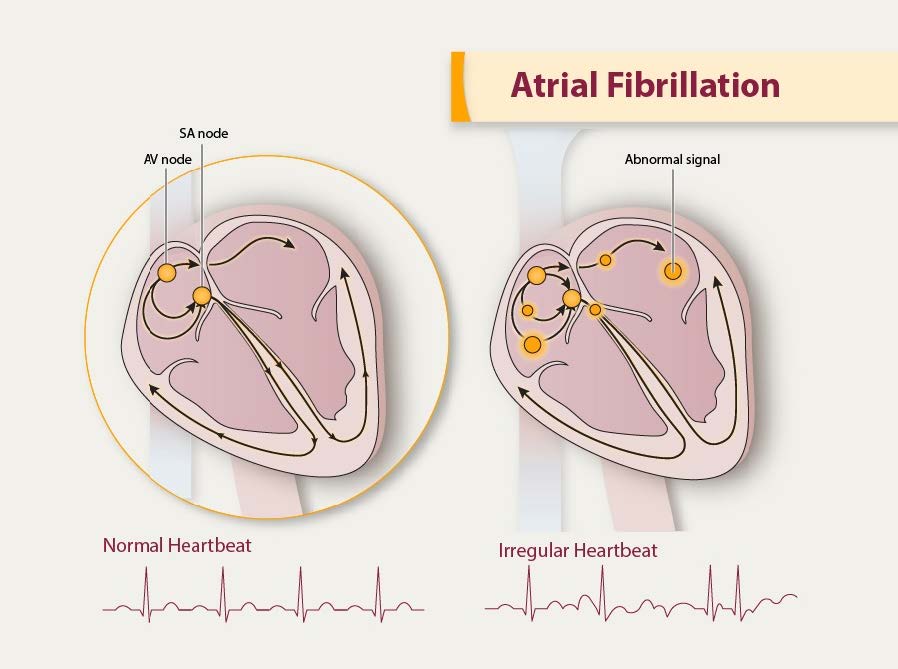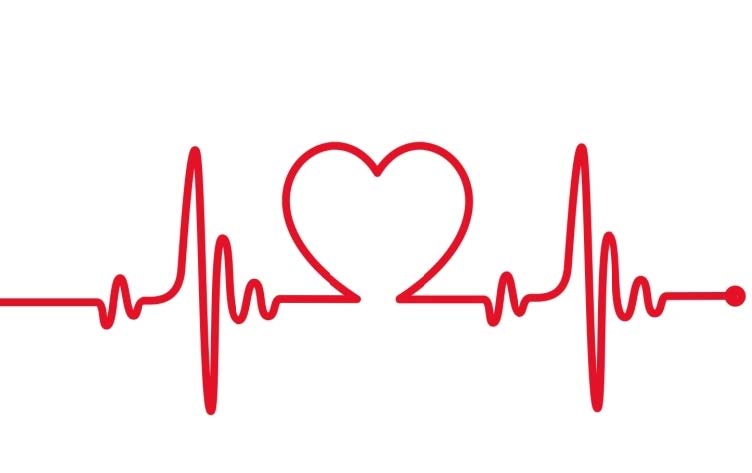Listening to Your Heart – Atrial Fibrillation
Everyone knows about heart attacks… but have you ever heard of atrial fibrillation? Despite being the most common heart arrhythmia (meaning irregular heartbeat) that is medically treated and being the cause for 1 in 7 strokes, most people aren’t familiar with atrial fibrillation. Surveys have revealed that even those who are aware of it often don’t consider it a serious medical condition. Education is key here, as leaving atrial fibrillation untreated doubles the risk of heart-related deaths and increases the risk of having a stroke significantly. It is estimated that by 2030, about 12.1 million people living in America will have a diagnosis of AFib. Considering how high that number is, it’s time to start paying attention to what it is and how you can mitigate yours and your loved ones’ risk factors!

What is Atrial Fibrillation?
So what is atrial fibrillation? Atrial fibrillation, abbreviated AFib, is an abnormal heart rhythm during which the top chambers of your heart, called your atria, quiver rather than beat, leading to inefficient movement of blood through your heart. Given the inefficient contraction of the heart, individuals with AFib are at a higher risk for clots. The higher risk of clotting and the decreased ability of the heart to pump blood efficiently is what leads to an increased risk of further heart conditions and stroke should a clot form and travel to the brain.
Common Symptoms
While some individuals with AFib might not know they have it and may experience no symptoms at all, others could experience a number of various symptoms. Pay attention to the symptoms and take action. Consider scheduling an appointment with your doctor if you or a loved one are experiencing any of the following:
- Irregular heartbeat (feels like your heart is flip-flopping, skipping a beat, or banging
- against your chest wall)
- Heart palpitations (fluttering, rapid, pounding)
- Lightheadedness
- Extreme fatigue
- Dizziness
- Shortness of breath
- Chest pain
Risk Factors
In addition to symptom monitoring, there are a number of risk factors to be aware of related to AFib. Considering the risk of stroke and heart disease increases significantly with AFib, mitigating the risk factors of AFib is crucial. Risk factors include:
- High blood pressure
- Increasing age
- Obesity
- European ancestry
- Diabetes
- Heart failure
- Ischemic heart disease
- Hyperthyroidism
- Chronic kidney disease
- Moderate to heavy alcohol use
- Smoking
If any of these risk factors apply to you or a loved one, consider if your risk factors are modifiable, meaning you have more control over reducing how much of a risk they pose. Focus on lowering your blood pressure, losing weight if appropriate, reducing or eliminating alcohol intake and quitting smoking. Consuming whole, natural foods when possible, incorporating exercise and purposeful movement every day, and staying hydrated can go a long way in preserving your health!
Treatment
If you have already been diagnosed with AFib, it is important to continue to mitigate as many risk factors as you can using the guidance above, in addition to seeking proper medical treatment for your condition. Lifestyle changes, even after being diagnosed with AFib, can greatly decrease the severity and frequency of your symptoms. These lifestyle changes include cutting back on alcohol, reducing caffeine, quitting smoking, exercising regularly, eating a nutrient rich diet, losing weight if required and lowering your blood pressure. When prescribed medications for AFib, especially blood thinners to reduce the risk of clots, it is imperative that you follow the guidance of your doctor and stay consistent with the treatment.
Understanding Your Medications
Given that AFib is a chronic condition, meaning it doesn’t go away, it is likely that you will be on medication to manage it for the rest of your life. This can be scary and anxiety inducing if you don’t understand your medications or don’t have a plan to stay on track. Meet with your doctor and be sure to understand what medications you are taking, why you are taking them, how long you will be taking them for and what side effects to look out for. You deserve to understand and feel comfortable with your treatment, so be sure to collaborate with your medical team and find support from your loved ones.

Atrial fibrillation – if it’s not taken seriously, it could cause serious problems!
Know the symptoms, schedule regular visits with your doctors, and practice a healthy lifestyle to reduce your risk!
Sources:
Image 1 – https://www.cdc.gov/heartdisease/atrial_fibrillation.htm
Image 2 – https://www.mcrmedical.com/blog/aha-2020-guidelines/
Heart Foundation –
https://www.heartfoundation.org.nz/your-heart/hearthelp/atrial-fibrillation/managing-your-af
CDC – https://www.cdc.gov/heartdisease/atrial_fibrillation.htm
American Heart Association –https://www.heart.org/en/health-topics/atrial-fibrillation/what-is-atrial-fibrillation-afib-or-af


